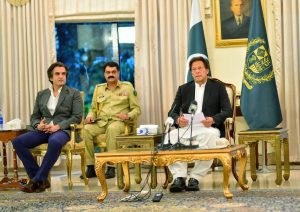As the state executives in Pakistan deliberate on ways to contain the aggressive spread of COVID-19, the disease caused by the novel coronavirus, the country’s ruling party has picked on the opposition for what it says is a “bundle of unrealistic desires.” The South Asian country has so far reported over a thousand coronavirus cases, but health and political experts warn that Pakistan’s poor health system, as well as government’s reluctance to announce a complete lockdown, could lead to an alarming increase in the number of COVID-19 patients.
Pakistani Prime Minister Imran Khan recently addressed a huddle of the country’s parliamentary leaders, which was aimed at formulating a joint strategy to combat the deadly virus. Among the participants were Shehbaz Sharif, the opposition leader in the national legislature, and Bilawal Bhutto-Zardari, chief of the Pakistan People’s Party (PPP), which governs Pakistan’s southeastern province of Sindh – which has been hit the hardest by the pandemic’s spread in the country.
After expressing his thoughts on the matter, Khan reportedly logged out of the video conference without listening to the suggestions of other political leaders. The act presumably perturbed both Sharif and Bhutto-Zardari, both of whom exited the multiparty conference in protest. In a video shared on social media, Sharif was seen to have inquired about the prime minister’s presence in the huddle and only announced his decision to withdraw from the conference after receiving the word that Khan was no longer present at the virtual meeting.
Both the PPP and Sharif’s Pakistan Muslim League-Nawaz (PML-N) party have called out the prime minister for his abrupt exit from the conference, questioning the government’s interest to develop an understanding with the opposition. Both Sharif and Bhutto-Zardari have stated that the premier is unwilling to consult them over the coronavirus pandemic.
A spokesperson for the government later said that opposition parties should “avoid mere criticism as a national obligation.” Firdous Ashiq Awan, an adviser to Khan, stated that Sharif, who has faced court proceedings for his alleged involvement in financial corruption, should “bring back his money and family for the betterment of people because the money actually belongs to the people.”
It seems that the prime minister’s apparent unwillingness to consult opposition leaders on such a critical issue stems from his refusal to acknowledge the administrative anomalies exhibited through his own party’s handling of the crisis in Punjab. In addition to being understaffed, public health institutes in Pakistan’s most populous province face an acute shortage of medical equipment – with hospital staff members lacking proper medical supplies to protect themselves against COVID-19.
Moreover, the provincial executive’s reluctance to declare an emergency, completely prohibiting people from leaving their homes, is seen as a major reason behind the upsurge in coronavirus cases. While the 18th amendment to the country’s constitution ensures provincial autonomy with regard to various subjects including health – as reflected in the Sindh government’s decision to impose a full-fledged lockdown to contain the spread of COVID-19 – Punjab has so far refrained from exercising the powers vested in it.
At a time when national consensus is considered key to tackling the novel coronavirus, the country’s top political leadership is bickering over past blunders. The People’s Party has already announced its decision to follow a “no criticism policy” against the federal government, with Bilawal Bhutto-Zardari stating that “blame game and political-point scoring” won’t do any good in the current situation. He is further insisting on cooperation and consensus to deal with the crisis.
Pakistan is edging toward a health disaster amid a lack of national unity. The results will prove to be catastrophic for this nation of 220 million people.
Manik Aftab is a freelance journalist based in Lahore.

































